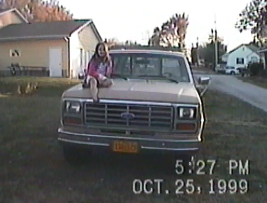 A F150 4-wheel-drive truck… It was the first truck I owned. It ran like a top until the convulsions started; driving down the road it would shake violently. After that happened a few times, I knew I needed to seek professional help. When I told my mechanic about the convulsions he immediately concluded, “it’s your spark plugs”. Later that day when I picked up my truck he said, “I changed the spark plugs and that should take care of it”. I paid the bill.
A F150 4-wheel-drive truck… It was the first truck I owned. It ran like a top until the convulsions started; driving down the road it would shake violently. After that happened a few times, I knew I needed to seek professional help. When I told my mechanic about the convulsions he immediately concluded, “it’s your spark plugs”. Later that day when I picked up my truck he said, “I changed the spark plugs and that should take care of it”. I paid the bill.
For the next week my truck drove great. He had fixed it, or did he? About a week later, it happened again; more convulsions. I took it back. This time the mechanic was less confident, concluding it was possibly the fuel filter. After he fixed it, it ran great…for a couple of days. Then the convulsions resumed.
The next time my mechanic said, “I can try, but no guarantee.” I remember saying, “what you mean to say is that you are guessing that you can fix it but if you’re wrong I still have to pay.” He responded “yup, that is pretty much what I am saying.” It took two more trips back to the shop before the mechanic correctly identified the problem. In the end, it was an electrical wire with a nick in the insulation. Out of the deal, I got a lot of new parts installed in my truck. It probably didn’t hurt to have a new fuel filter and spark plugs. It may have improved my gas mileage. But those didn’t solve the problem. The correct answer only came from trial and error. Maybe modern diagnostics could have saved me some money.
Farmers too, get plenty of guess work about how to improve their soil health and water quality. But the problem of course, is no one seems to be taking the time to correctly identify the underlying problem. I often recall the advice of one of my mentors, Lyle Asell, from my NRCS days. On more than one occasion Lyle warned me, “Don’t jump to conclusions. Most resource professionals want to start giving solutions before they identify the problem. You would do a lot more good if you spend more time identifying the true problem before moving to solutions.”
Lyle’s advice has been very valuable to me over the years. As an example, it has become fashionable to recommend filter strips along every water body. However, without diagnosing the underlying concern, this recommendation is kind of like playing a guessing game to fix an unknown problem. That seems archaic, to me, when we have so many analytic tools at our disposal.
In the big scheme of things, replacing a few spark plugs and a fuel filter just to realize it didn’t fix the problem might seem minor but imagine if it were bigger and more expensive things. If the tools are available now to pinpoint the problem without the trial and error approach, why wouldn’t we use them?
 Who should pay?
Who should pay?
Great analogy, Tom. It is true in many other aspects of agriculture as well, seed, applications and irrigation, to name a few.
Another analogy I have heard used is that we do a lot shooting at targets to site in our hunting rifle, we adjust the scope or our position, but we never actually go look at the target. We do a lot of things in the field and then almost never measure how successful, or unsuccessful, we were. We have too much data and don’t know what to do, we don’t have good metrics, or we don’t have time. All true, and we then, we still learn by trial and error.
This is a great time to be in Ag. Lots of creative solutions at all levels, including conservation. We will tackle this challenge and overcome it as we have other things over the years.
Thanks for you analogy, Jason. I agree, it is an exciting time to be working in agriculture, and more exciting the union of agriculture and environment.
Awesome article Tom!
There is so much to learn and I agree that it is an exciting time to be in ag, especially as a student graduating in May! I have been working on helping farmers adopt conservation practices, manage nutrients, improve water quality, and improve economics with the focus on soil health and soil biology. My mentality is to quantify various soil parameters and compare the effect of all sorts of management practices. We can learn what is working already and what practices are improving the soil.
Seems like our processes align nicely! I would love to share more!
Mitchell, congratulations on graduating from Iowa State. Can’t do better than that! Thanks for your comment. I will call you next time I am in Ames.
Any time Tom! Thanks